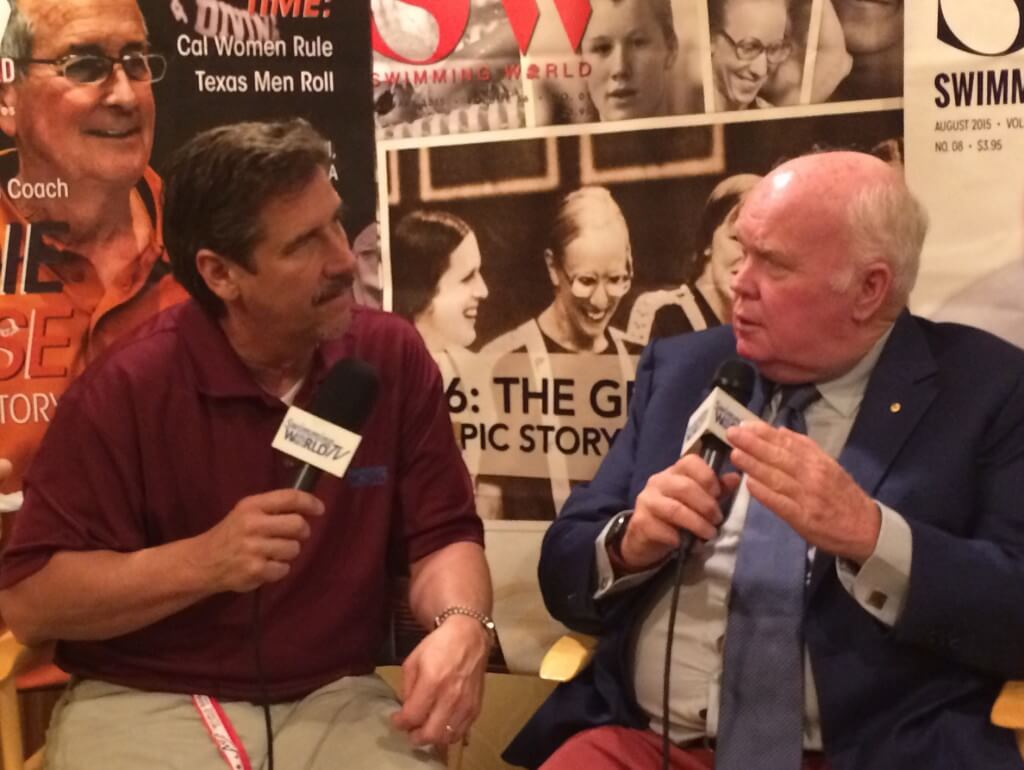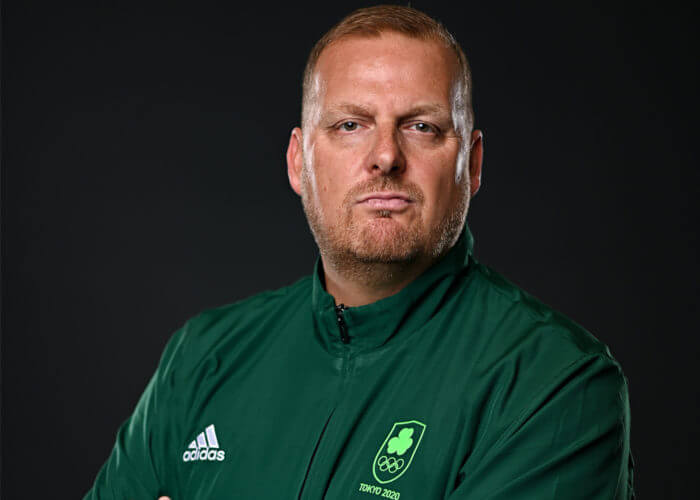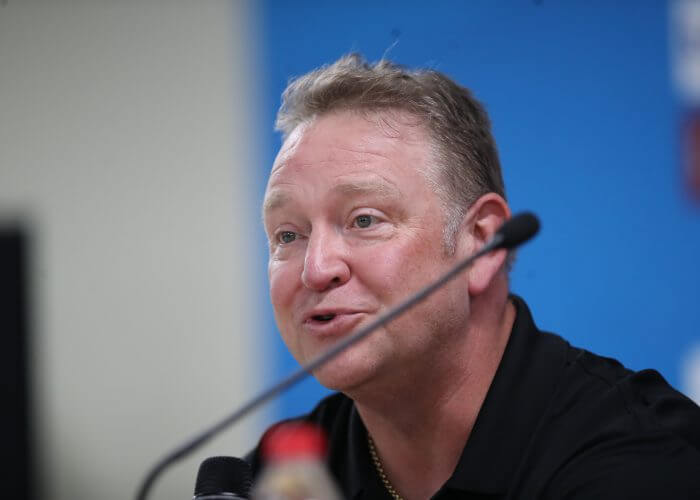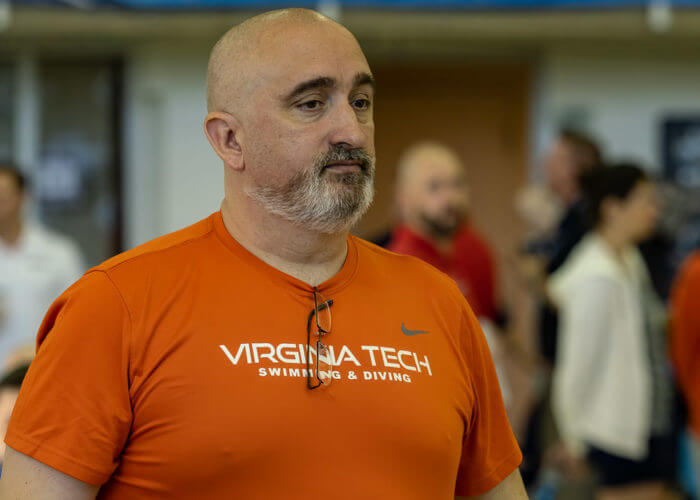Learning From Colleagues (Part II): The International Bond Among Coaches

Learning From Colleagues (Part II): The International Bond Among Coaches
Swimming World explores the fraternal nature of how coaches learn from one another. Not surprisingly, such education isn’t always about X’s and O’s, but borne from familial relationships that reveal the caring for athletes, which at its heart, underscores the beauty and essence of our sport.
In its March quarterly magazine, Swimming World surveyed some domestic coaches regarding their coaching educations. In Part II, we explore the wisdom imparted by select international coaches.
Bill Sweetenham has coached swimming teams in his native Australia, Great Britain, Hong Kong and Argentina. He has headed national teams at five Olympic Games, mentored nine world record holders and 27 Olympic/World Championship medalists. Among those elite athletes stand Stephen Holland, Tracey Wickham, Michelle Ford, Michelle Pearson, Karen Phillips, Rob Woodhouse, et al.
Sweetenham was also the national performance director for British Swimming from November 2000 to September 2007. In that time, Britain won as many medals at the 2001, 2003 and 2005 Swimming World Championships as it had at the same previous meets dating back to 1973. Well honored in Australia, he was inducted into the International Swimming Hall of Fame.
His relentless pursuit of what he calls “the attainment of wisdom” regarding swimming and life knows no bounds. He has a worldwide circle of friends and is constantly asking questions, probing for answers to get better performance. Often a stranger in his own land, Sweetenham’s voice has invariably found traction among aquatic cognoscenti.
He has been driven by the notion that “Compromise is the fertilizer in the garden of failure. Work only with good, right and best people with all clients, customers and staff,” he advises, because “the attainment of wisdom along with the psychology of communication is a long journey of chaos and adaptive thinking and action.”
That philosophy lives today Down Under as symbolized by stunning re-emergence of Aussie swimmers guided by the likes of Michael Bohl, Dean Boxall, Vince Raleigh, Janelle Pallister and others. Want proof? The Australian medal haul in recent Olympic, World and Commonwealth Games shows no sign of stopping.
Sweetenham’s earliest earnest efforts at sport were in track where he earned a scholarship to train with the erudite Percy Cerutty, coach of middle distance world record holder, Herb Elliott. To describe Elliott, Cerutty coined the term “Stotan,” a cross between stoic and spartan. Cerutty believed that athletes who meshed mind and body with the forces of nature and the universe could be successful. Sweetenham bought into the importance of developing the athlete as a strong all-around athlete and made it a training bedrock throughout his career.
He has shared his beliefs with anyone who would listen, crediting, among others, Gregg Troy, Mark Schubert, Dr. Bruce Laurie, David Pyne, Doc Counsilman, Don Gambril, Dick Hannula, Eddie Reese and Larry Larsen as members of a community that has “provided incredible learnings to me.”
BY WAY OF CANADA
Ben Keast, former assistant coach at Swimming Canada’s High Performance Centre in Vancouver is now at SwimMAC Carolina (Charlotte, N.C.). He has worked with some of Canada’s very best swimmers (including Olympic medalists), with ISL’s Energy Standard team members as well as very young age groupers. “I’m eager to know about different styles and approaches and what works for swimmers and what doesn’t,” he says. In pursuit of that knowledge, Keast has read voraciously, gone to clinics and rubbed shoulders with some of the world’s best coaches.
A brief capsule of what Keast has learned from his coaching colleagues appears in the paragraphs below:
Tom Rushton (High Performance Centre-Montreal, Energy Standard, Estonia/Israel): “Rushton says to ‘be what they need you to be.’ Tom is among the most intelligent and well-prepared coaches with whom I have worked. He brought me into coaching, and I could not have asked for a better mentor. As our age-group team got better, our expectations got higher. Tom would remind me that being prepared was critical, but second to my outward appearance and interactions with athletes, which would demonstrate my confidence in them and caring for them as people. After a big race, he’d caution: ‘The swimmers are always watching you.’”
 Jon Rudd (Plymouth Leander, Swim Ireland): “Your swimmer has one career. Jon imparted that I might see several generations of swimmers in my coaching career, but each athlete with whom I worked with only had one shot. ‘It is our duty as coaches to know our athletes and learn from our mistakes as fast as possible, carefully considering the strengths, weaknesses, opportunities and threats in their long-term development,’ he says. Jon had a great system of logging swim practices involving two logbooks: one where he would draft practices and a second where he took a few minutes immediately after the session to record what happened. This second book not only had the final version of the practice, including modifications and set results, but all Jon’s observations and impressions fresh from that session. The point being that constant reflection is necessary if you wish to learn fast and stay ahead of your swimmer.”
Jon Rudd (Plymouth Leander, Swim Ireland): “Your swimmer has one career. Jon imparted that I might see several generations of swimmers in my coaching career, but each athlete with whom I worked with only had one shot. ‘It is our duty as coaches to know our athletes and learn from our mistakes as fast as possible, carefully considering the strengths, weaknesses, opportunities and threats in their long-term development,’ he says. Jon had a great system of logging swim practices involving two logbooks: one where he would draft practices and a second where he took a few minutes immediately after the session to record what happened. This second book not only had the final version of the practice, including modifications and set results, but all Jon’s observations and impressions fresh from that session. The point being that constant reflection is necessary if you wish to learn fast and stay ahead of your swimmer.”
Tom Johnson (High Performance Centre-Vancouver, Swimming Canada): “Coach the swimmers in front of you. Tom always viewed his athletes as people first and swimmers second. ‘You’ve got to see the white of their eyes,’ he would say when I asked about practice planning. He underlined the importance of not getting ahead of yourself until you’d gauged the physical and emotional state of the athletes, spoken with them and understood their mindset. ‘Sprinters feel everything,’ he says. You might have a well-organized plan or progression for your athletes, but are they ready to absorb what you have to offer? If you listen, will you learn something important about the athlete?”
Dave Johnson (Cascade Swimming, Swimming Canada): “Just produce. Since returning to club coaching from Swimming Canada, Dave has regularly placed swimmers on the Canadian national team. He keeps it simple. Nurture one athlete, then two, then three. Keep the aim clear. By focusing on what’s in the front of you and determining what is required to move forward, you eliminate distraction and hit your targets. With so much going on for the average club coach, it’s easy to see where someone can lose track of this imperative.”
Joszef Nagy (Hungarian Olympic coach, 2014 ISHOF inductee): “This legendary ISHOF inductee believed that the masters have no secrets. He was a wealth of knowledge and welcomed any coach who wanted to sit in on his practices, provided they asked questions. He was an open book, showing me that those comfortable in their knowledge and experience shared it with others. Meticulous and known for unrelenting attention to detail, I recall he encouraged the same from his swimmers by compiling a list of technical corrections. Each practice, both he and the swimmer would choose one focal point from the list. In this way, he promoted athlete autonomy and re-established their shared goal every session.”
Randy Bennett (High Performance Centre-Victoria, Swimming Canada) : “It’s always yes or no. Randy was notoriously single-minded in his pursuit of excellence. His staff and swimmers shared his determined vision. At weekly meetings, they would discuss the progress of their program and the swimmers. When it came to making decisions, Randy made it very simple: Is this a high-performance decision or not? Will this action support winning medals at the World Championships or Olympics? Yes or no—from the macro to the micro, everything was boiled down to that. Answer ‘yes,’ and the topic was pursued vigorously. Answer ‘no,’ and the topic was summarily dropped. Distractions were cast aside, and everything became crystal clear for everyone involved.”

Photo Courtesy: Swimming Canada / Ian MacNicol
John Atkinson (High Performance Director, Swimming Canada): “No drama. John had an unassailable rule for national teams. It was ‘no drama.’ When you consider all that can go wrong in big competitions, this is surprisingly challenging to uphold! The pause and deliberation before your reaction becomes very important. As a coach, it reminded me that my behaviors would be observed and mirrored, and that composure in high-stakes situations often made the difference between a podium performance or not.”
Ben Titley (High Performance Centre-Ontario, National Centre Spain): “Continuous stimulation. Ben found all kinds of ways to make his athletes fast. He said that slow swimming was boring to him, even in practice, so he made sessions interesting for everyone! To the uninitiated, his practices felt like organized chaos, with head-spinning demand changes, from equipment flying on and off, to varied repeat lengths and drills. Four or five different practices—one for each athlete—happened simultaneously. Closer examination showed these were highly choreographed sessions—down to the minute—and intentionally designed to elicit more power and more speed. Not only were these sessions unrelenting physically, but they commanded undivided attention and energy, leading to maximum engagement from athletes and staff. From Ben, I learned what could be accomplished in a swim practice—the layers and depths of complexity, based on fundamental principles—and executed to the highest standards.”
Ryan Mallette (High Performance Centre-Victoria, High Performance Centre-Ontario): “Have the hard conversation. Conflict breeds resolution, and waiting to find a resolution by avoiding tough interactions often makes a situation worse. Ryan invited and sought out those moments, cutting through the noise to get right to the heart of the matter. In the practice, this galvanized a culture of honesty and commitment to world-leading standards. In high-stakes competition situations, this brought focus back to common goals and what was immediately actionable. I’ve witnessed him bring a swimmer back from the brink of collapse to succeed at the highest level in the same meet.”
Bill Sweetenham (ISHOF inductee): “When was the last time you did something for the first time? One season, Swimming Canada took a youth team to Australia for their age group champs. Bill was our mentor coach for the training camp afterward. He encouraged us in various ways to think outside the box with our coaching. When teaching a new skill, he asked us to recall when was the last time we did something for the first time? ‘Remember how alien and challenging that might have been—how thrilling and different?’ he’d ask. ‘Now, consider that when designing a progression or explaining a brand-new movement pattern to an athlete!’”
Chuck Batchelor (head coach, SwimMAC; head coach, Bluefish): “Doing things the right way. There’s believing it can be done, knowing how to do it, and then actually doing it the right way. Chuck has a test for new coaches where he asks them to make a sandwich. He looks for the coach to use all the ingredients without skimping or cutting corners. ‘Spread it to the edges!’ he would say. What resources do you have at your fingers, and are you utilizing them fully, every day? If you’re going to pursue excellence, be excellent and especially so in the details. How you do one thing is how you should strive to do everything. This is the culture that Chuck inspires at SwimMAC.”

Photo Courtesy: Peter H. Bick
Sergio Lopez (Virginia Tech, Singapore, Bolles School): “Make them believe. I visited Sergio with an athlete while he was leading the Bolles School with an incredible group of high school swimmers, including three soon-to-be Olympic champions. He shared that your athletes needed to know that you believed in them. To instill that belief, he began the season with athlete-coach meetings where he would propose a big goal in a quiet, almost conspiratorial way, as if they were embarking on the secret mission together—which they were! I remember thinking to myself: This is the magic of coaching.”
James Gibson (Energy Standard): “Bring the energy! James embodied the role of the coach as a psychologist. For the sprinter, this is especially important. He put himself in the swimmer’s shoes. When you look to your coach, you want to see him brimming with unfalteringly positivity and optimism because that conveys steadfast confidence in you. James controlled the mood and managed the environment in the way he interacted with swimmers, designed practices and brought the team together for meetings. With his words and actions, James telegraphed to the swimmers they were ready, and it was their time to shine. And they did!”
In a nutshell, coaching words to live by.
* * * * *
Following are excerpts from a PowerPoint Bill Sweetenham made for his grandchildren. They contain immutable truths to help them—and any coach—navigate the road ahead.
• “What you leave behind is not engraved in stone monuments, but what is woven into the fabric of others’ lives.”—Pericles
• The only real advantage that we can enjoy is the ability to learn, adapt and improve in advance of our opposition.
• There are only three ways to succeed and win:
1) Your own personal and team strengths
2) On your opposition’s personal and team weaknesses
3) Or a combination of both
• Never accept second or less in anything and everything that you had both the capacity and capability to win. Never accept NO as an end result. Success is the only considered option. Excellence is not exclusive. It is available to all!
• Frequency of exposure to perfection creates the stimulus for improvement-based adaptation.
• Always learn and prepare above the standard and level of your classroom, facility and environment.
• The least fit, talented and skilled in the team must be in advance of the fittest, strongest character and attitude of the best prepared of the opposition.
• Excellence will always be out of reach of your comfort zone…and always within reach of your self-belief.
• The student’s trust in the teacher and the teacher’s belief in the students create unconditional successful and winning partnerships. These winning partnerships are the key ingredients for competitive success.
• Great people and athletes (like Formula One cars) do not come from an assembly line. They are individually fine-tuned and prepared to be the fastest and most superior of their kind. Excellence is available to everyone.
• You will be better tomorrow because of what you did or did not do today. Today and now matters! Live with a sense of urgency. Every child has talent.
• Winning is producing your best result and performance under unfavorable conditions and pressure, knowing that your attitude rose above all other conditions. Winning is also knowing that your preparation for the perfect performance was complete, leaving nothing to chance while nothing was saved in your efforts given.
• Identify the perceived weakness of the team and develop that as your individual strength. You will soon be the strongest, most effective and reliable link in the team chain. The team will enjoy minimal weaknesses. Efficiency is your own personal commitment to perfection above and in advance of commitment to hard work. Efficiency always defeats fitness. Great athletes know what good athletes don’t. Good athletes and coaches commit to competition and winning.
• “In Olympic sport, compare yourself and personal achievements globally well in advance of national or state standards. Few professions like domestic team sports and politics are capable of this standard. You will be judged by people who are participation-based in preference to commitment to global standards. Pretenders survive in most fields of endeavor, however, never in sport.”—Coach Michael Bohl, Australia
Michael J. Stott is an ASCA Level 5 coach, golf and swimming writer. His critically acclaimed coming-of-age golf novel, “Too Much Loft,” is in its second printing, and is available from store.Bookbaby.com, Amazon, B&N and distributors worldwide.



